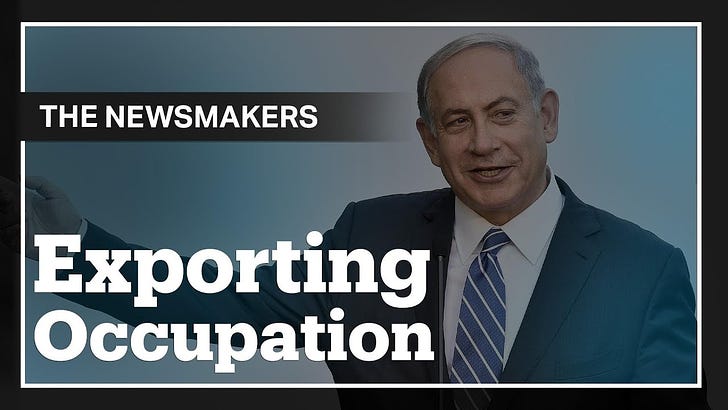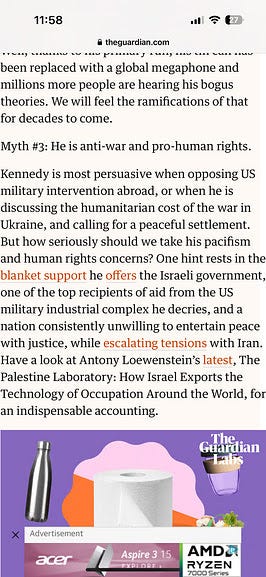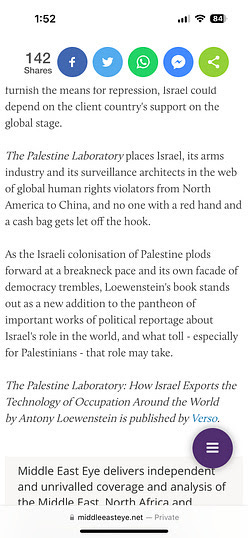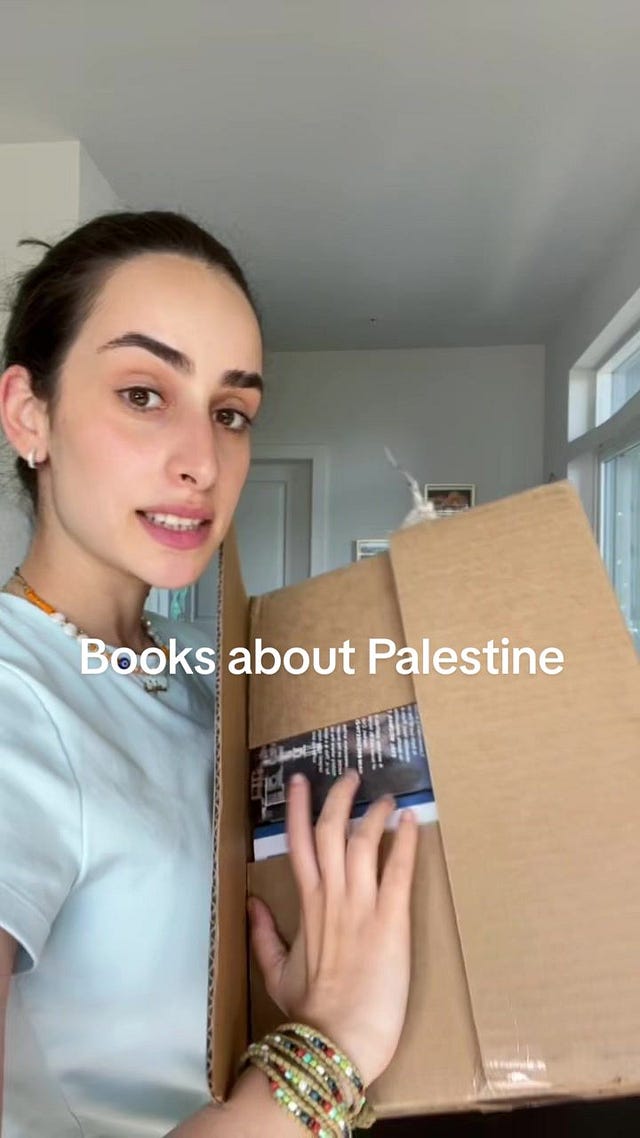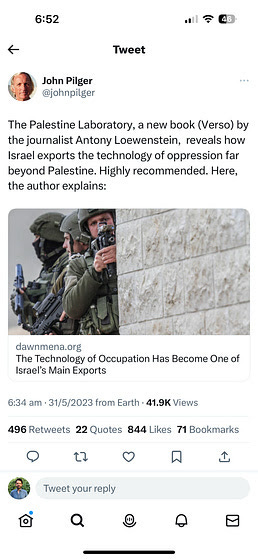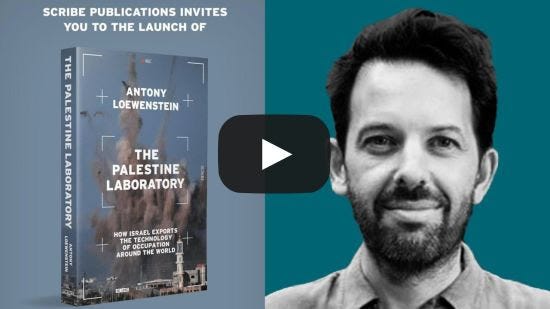The Palestine Laboratory is taking on the world
There's a growing openness to discuss Israeli occupation and its architecture of control
Dear friends,
It’s been a wild month since my new book, The Palestine Laboratory, was released across the world. The response has been mostly positive, in the US, UK and Australia, and suggests that there’s a willingness to interrogate the ways in which Israel’s occupation of Palestine is one of the longest occupations of our time.
With Israel’s far-right government accelerating an agenda of solidifying its colonisation project in Palestine, my book is giving context for the issues in the Middle East beyond the latest headlines.
Israel/Palestine isn’t just a conflict between two, vastly unequal sides; it’s a model of repression that’s exported to over 130 countries across the world.
With Israel announcing its record 2022 arms sales, US$12.5 billion, 24 percent of which were sold to autocratic Arab regimes, it’s obvious that the Israeli weapons industry is a clear and present danger to civilians globally.
After my debut on US prime-time TV last month, I’ve been speaking to countless media outlets about Israel’s techno-dystopian industrial complex and the profound danger that it poses.
What follows is a summary of news, reviews, coverage and interviews for your reading, listening and viewing pleasure (forgive the length of this message, but a lot is going on). In the coming months, I’ll be speaking in many cities and countries so stay tuned.
Writer and author Naomi Klein wrote a compelling column in the Guardian about the US Presidential candidate Robert F Kennedy Jr, and his multiple failings around foreign policy, vaccines and the climate, and name-checked my book:
The Financial Times, one of the world’s biggest newspapers, reviewed my book (a 7/10 vibe with criticisms that I don’t agree with but that’s the life of an author) and Britain’s Chatham House published a mostly positive review. The Conversation wrote a long review and framed the Israeli arms trade as an ever-expanding military industrial complex.
The UK’s Middle East Eye reviewed the book and its writer, journalist Patrick Strickland, understood its message:
The massively popular TikTok has embraced The Palestine Laboratory so very thankful that a younger generation will find it there:
 Tiktok failed to load.
Tiktok failed to load.Enable 3rd party cookies or use another browser
The global broadcaster TRT World invited me on to discuss the book and also the wider implications for global conflict:
I wrote a long essay for Middle East Eye on how Israel’s weapons industry is inspiring nations from Taiwan to Ukraine (with most states conveniently ignoring the Palestinians).
My interview with the Electronic Intifada details the dangers of Israel “battle-testing” weapons on Palestinians under occupation:
The US-based LitHub magazine had me on as did Australia’s most popular book-related podcast, Better Reading (where I had time to get a little personal about my background and work).
The wonderful podcast, This Machine Kills, which focuses on tech and political economy, was a space where we could discuss Israeli aims to assist the global border surveillance industrial complex in the coming decades as climate refugees increase:
It was a similar theme taken up on the Long Road Magazine, a European-based outlet that focuses on borders and borderlands. Israel is assisting the European Union in maintaining its brutal regime against brown and black refugees (here’s a 2019 story in the UK Observer that I co-wrote about this disturbing trend):
One of the great aspects of this podcast is having the wonderful Sudanese artist, Azza Abbaro, sketch its guests. An accurate representation so thank you, Azza:
Israeli spyware and phone hacking tools are ubiquitous across the globe, including in Australia. For the media outlet that I co-founded and co-edit, Declassified Australia, we published an extract from the book and an investigation into the Israeli surveillance company, Cellebrite, in Australia.
Speaking of Declassified Australia, we continue to publish unique journalism including an exclusive on the AUKUS nuclear submarine deal with the US and a critical look at Indian Prime Minister Modi and his worrying love affair with Australia.
My Declassified Australia partner, journalist Peter Cronau, interviewed me about my new book at the recent Addi Road Writer’s Festival in Sydney:
I was interviewed about Cellebrite and spyware on ABC Radio Sydney and Canberra in Australia and The Briefing podcast:
The South China Morning Post interviewed me about the book and China’s growing role in the Middle East.
The US outlet, In These Times, published an edited book extract on how Israeli spyware represents an existential threat to global privacy.
I was interviewed on the US TV program, The Majority Report, and the US radio station KPFK’s program, Middle East in Focus.
Progressive International (PI) is a major global network of left-wing activists and organisations (they also organise the Belmarsh Tribunal on the outrage of the Assange incarceration, and Declassified Australia was a sponsor in its recent Sydney incarnation). PI interviewed me about my new book with a focus on ethno-nationalism.
On the US radio program, Background Briefing, we discussed my book, war crimes in Afghanistan and the ongoing torture of Wikileaks founder, Julian Assange.
The podcast, The Jist, was an interesting discussion about the lack of media diversity in the West and how the news gap between rich and poor is worsening:
On ABC Radio in Adelaide, Australia, we had a conversation about my Jewish identity and work on the Middle East (partly inspired by my recent magazine story in the Good Weekend in the Sydney Morning Herald and Melbourne Age newspapers).
The podcast for Canadians for Justice and Peace in the Middle East partly focused on the countless nations desperate for Israeli weapons.
I’m currently doing a number of live events around the book. One of the first was in Sydney, Australia, introduced by Greens Senator Dr Mehreen Faruqi:
Her speech was moving and insightful and touched on colonialism, independent journalism and resistance. Read it.
Beyond the book, I’m also working on a range of other stories and issues.
Here’s my story in Australian outlet Crikey on the Greens adopting a powerful new policy around Israel/Palestine.
My letter in the Australian Book Review about the failings of Israeli “democracy”.
I recently interviewed the great photojournalist Andrew Quilty, who lived in Afghanistan for many years, about his work in the country, the Taliban and responsibilities of war reporting. The event was held at the Newcastle Writer’s Festival:
My interview with global broadcaster TRT World about the the growing bromance between Saudi Arabia and Israel:
My interview on TRT World’s program The Newsmakers about the desperate plight of Wikileaks founder Julian Assange and the Australian government’s complicity:
Thanks for all your interest and please back independent journalism in any way that you can.
You can find my entire work archive at my website.
Until next time,
Antony

